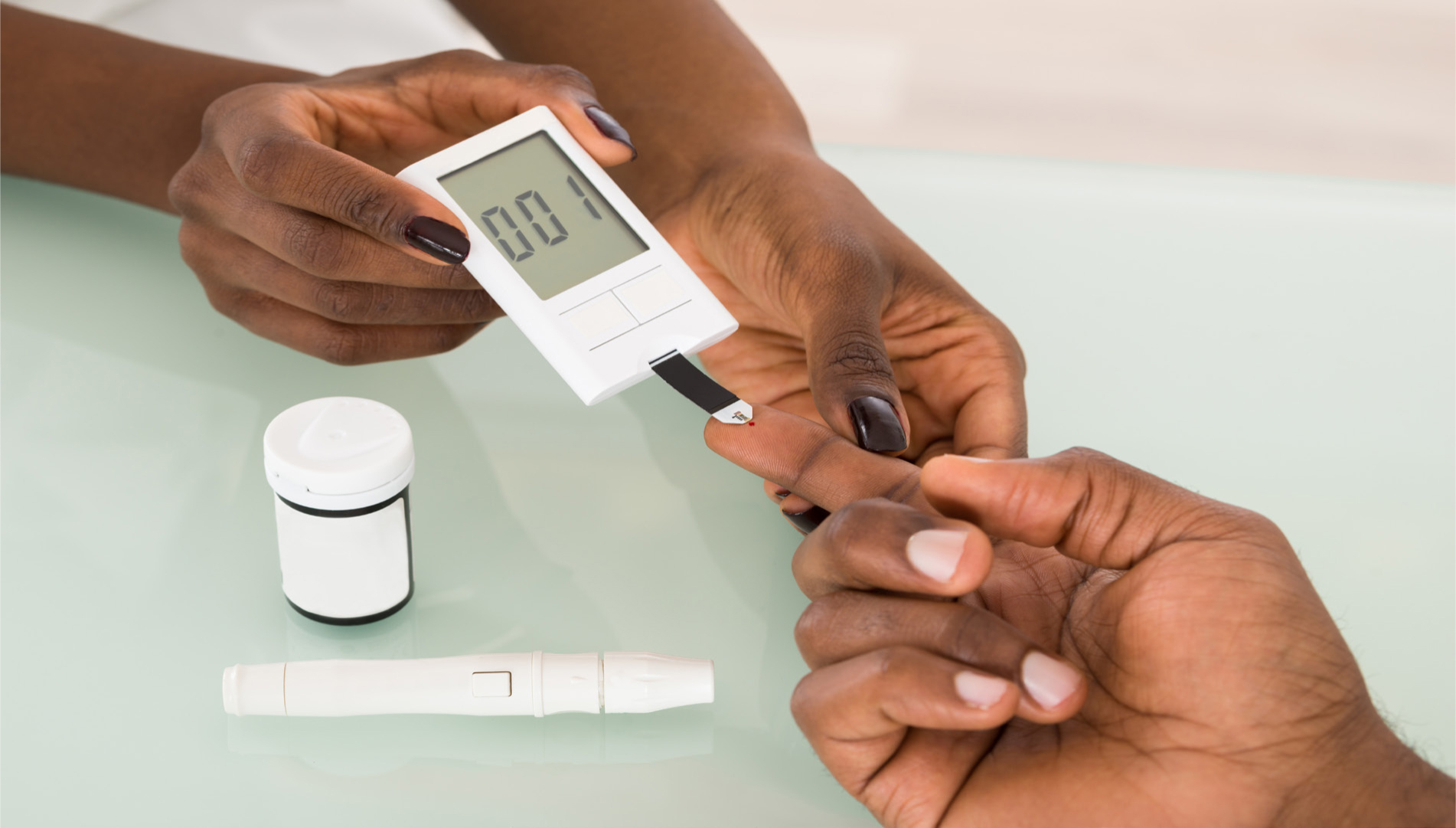One in four people in the UK have diabetes (Diabetes UK, 2010), but with some small changes to lifestyle, considerable differences in diabetes control can be achieved. Diabetes is a condition where the amount of glucose in the blood is very high because the hormone, insulin, is absent (type 1 diabetes) or cannot work correctly because there is too much fat around body cells (type 2 diabetes). In the UK, 90% of cases are of type 2 diabetes, triggered by a sedentary lifestyle and obesity. Type 2 diabetes usually arises in this situation due to metabolic syndrome, a collection of risk factors such as insulin resistance, high blood pressure, obesity and unhealthy levels of blood fats (HEART UK, 2021). Type 2 diabetes may also occur in older adults due to the insulin-producing cells of the pancreas wearing out, rather than the condition being due to lifestyle factors, although there is less emphasis on tight glycaemic control for these patients (Quartuccio and Kalyani, 2017).
If blood glucose levels are not properly managed with insulin or medication, serious complications can develop, such as heart and circulatory system disease, nerve damage (neuropathy), diabetic eye disease (retinopathy) and kidney disease (nephropathy). People with type 2 diabetes are particularly at risk from heart disease due to increased hardening of the arteries and high levels of blood fats and blood glucose associated with the condition (Abdul-Ghani et al, 2017). Although individuals who take insulin to treat their diabetes-whether type 1 or type 2-risk having occasional low blood glucose levels, the long-term effects of abnormally raised glucose over time is the reason diabetes must be well controlled.
Glucose can also attach itself to white blood cells, so if levels are higher than normal (5–7 mmol/L), this can alter the function of cells-red blood cells are unable to hold as much oxygen, and white blood cells are less able to fight infection (Wilson, 2019). This means that the individual must learn to manage their condition so blood glucose is kept within a near-normal range to minimise the risk of these health problems. Diabetes is, therefore, unlike any other chronic health condition, as it is necessary for the individual to deliver the vast majority of their own care.
This high demand for self-care behaviours takes a considerable toll on the physical and psychological wellbeing of the individual, both in terms of their ability to cope with the initial diagnosis of the disease and adopting ongoing diabetes self-management activities into their lifestyle as well as coping with the long-term challenges that the condition poses. Living well with diabetes requires a good level of care from both health professionals and the individual; the physical consequences of having diabetes exert a substantial impact on mental health and wellbeing, which escalates with duration of diabetes and any complications. The cost to mental health may be perceived as negligible or devastating, depending on the degree of disability and the level of disruption to the individual's life, their coping style, the presence of other health conditions that must also be managed and the individual's perceptions of the health challenges they face (Wilson, 2019). Recognising why and how these issues impact diabetes self-management is the first step towards being able to address these problems.
Diabetes education for self-care
Self-care in diabetes involves the development of knowledge and awareness by learning to live with the complex nature of the condition in a social context. The national service framework for diabetes, standard 3 (UK Government, 2001), suggested that structured education and psychological support are the key to living well with diabetes. Interventions designed to encourage patient motivation and confidence in their health behaviours are sporadic, and even fewer have been aimed specifically at diabetes self-care (Swanson and Maltinsky, 2019). Educational interventions need to go further than addressing issues of motivation and confidence that impact on behaviour; they must highlight the components making up that behaviour, such as self-efficacy and empowerment.
 In order to be specific and successful, health interventions must only target a single behaviour, such as regular blood glucose self-monitoring
In order to be specific and successful, health interventions must only target a single behaviour, such as regular blood glucose self-monitoring
Focusing on changing behaviour to make a difference
The acquisition of knowledge does not transfer directly into understanding. Despite this, ‘knowing the enemy’, that is, high glucose levels triggering and worsening diabetic complications, has long been regarded as necessary in order to adopt effective self-management behaviours. Therefore, education around why good glycaemic control is important must ensure the individual's understanding of this key purpose. In order to be specific and successful, health interventions must only target a single behaviour (MacDonald et al, 2016), such as regular blood glucose self-monitoring, and employ measures to encourage that behaviour. In terms of diabetes care, individual health education tends to be employed, as there are no specific interventions that target poor self-care behaviour. For those with type 2 diabetes that has developed due to obesity and a sedentary lifestyle, where insulin cannot work effectively due to the presence of fat in the body cells, interventions to target obesity may be of value. Individuals who receive intensive counselling regarding behavioural intention may also achieve a greater weight loss than those who do not (NHS, 2018).
Empowerment
Motivation for diabetes self-care relies on perceived vulnerability to complications and a high degree of self-efficacy. The concepts controlling a chronic illness and empowerment-increasing understanding and potential for diabetes self-care-are closely linked to self-efficacy and are often applied to diabetes management (Wong-Rieger and Rieger, 2013). The delivery of diabetes education by health professionals needs to address patient-centred issues in order for empowerment and self-efficacy to develop. The concepts of self-efficacy and patient empowerment are, therefore, strongly related to the diabetes care delivered by health professionals. The principle of self-efficacy suggests that poor self-efficacy is associated with harmful health-related behaviours, such as neglecting to test blood glucose levels before sleep or driving a vehicle; empowerment has been cited as the key to this process in diabetes self-management through knowledge, control and the ability to implement decisions (Scambler et al, 2014).
Costs
Diabetes now presents health services with a huge challenge in terms of provision and cost, with type 2 diabetes escalating to epidemic proportions in recent years. The impact of diabetes self-management also exerts a toll on the mental health of the individual, which may be minimal or overwhelming. This depends on the degree of disability and the level of disruption to the individual's life, their coping style, the presence of other acute and chronic health conditions that must also be managed and the perceptions of the health challenges that need to be met. In the UK, NHS usage for individuals with diabetes increases from an average of £3910 per annum per person to £5670 when the cost of treating mental health problems is included (Naylor et al, 2012).
Conclusion
Diabetes education programmes include community health workers as team members in a number of roles, enabling patients to improve their diabetes self-management knowledge and behaviour. However, further research in this respect regarding the role of community health professionals is needed to understand the incremental benefit of diabetes education interventions. Additional research is also necessary to identify appropriate settings and optimal roles for community health professionals in the care and management of individuals with diabetes.
KEY POINTS
- Any health professional can use their position to reinforce diabetes health education with patients regarding the importance of good glycaemic control to prevent, minimise or delay complications
- Patients may be educated/supported with their diabetes self-management behaviour by ensuring they understand why their condition has to be well-managed and how this can be achieved
- The National Service Framework for Diabetes states the vital importance of education and support in the empowerment of individuals with diabetes; this could be achieved by the development of a service model that facilitates self-care
- The key message concerning many cases of type 2 diabetes, with the huge cost implications that metabolic syndrome involves, is that patients can adopt lifestyle changes to vastly improve or even reverse their condition
CPD REFLECTIVE QUESTIONS
- What are the implications for the care, management and education of patients with diabetes, particularly the newly diagnosed?
- What factors can affect the impact of a diabetes diagnosis on patients' mental health?
- How can community health professionals empower patients with diabetes to self-manage their condition?


